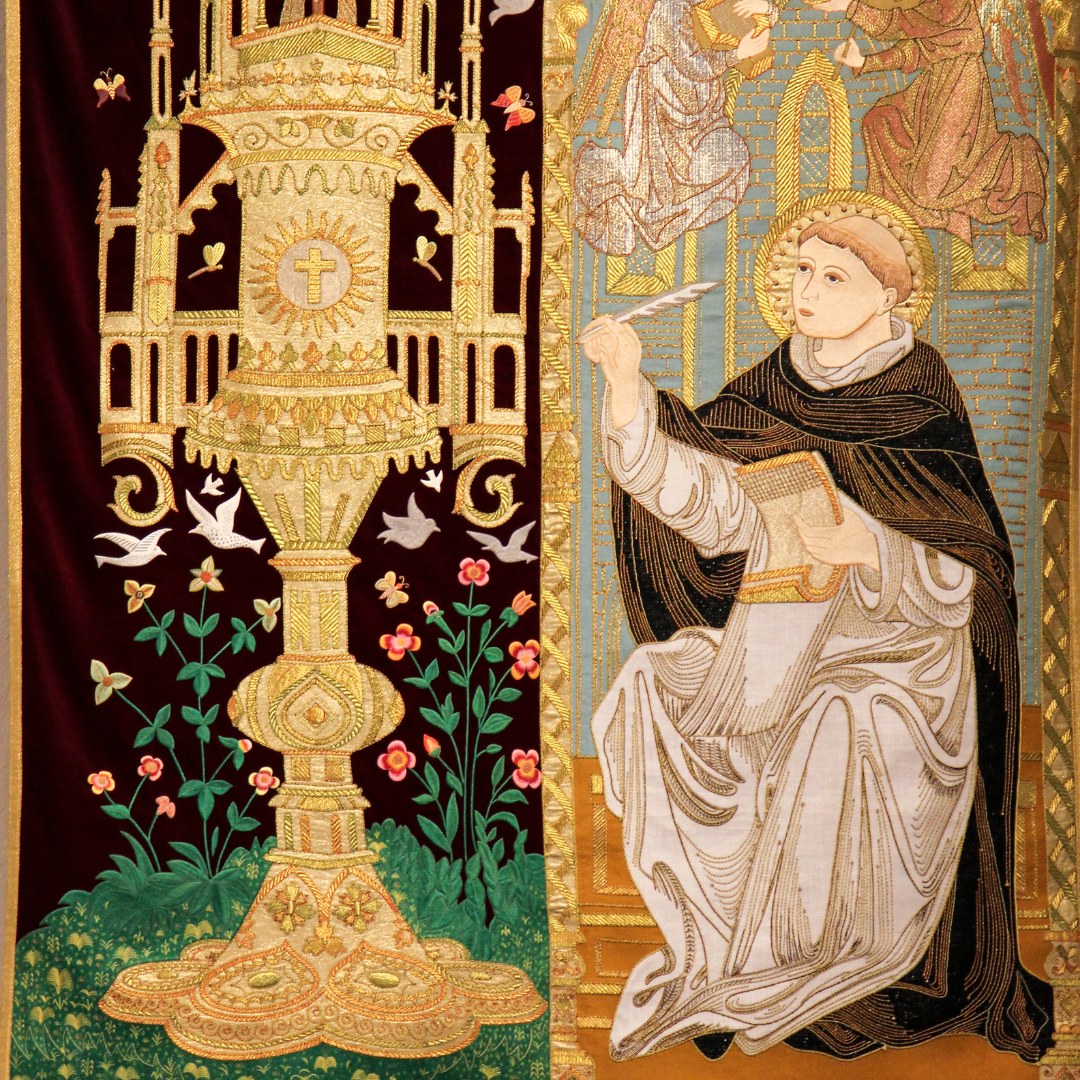Saint Thomas Aquinas is one of the most important theologians in the history of the Catholic Church.
One of the defining aspects of his sainthood was his lifelong devotion to the Eucharist--a love he dedicated to the entirety of his soul and intellect.
As we prepare for the Solemnity of Corpus Christi and the National Eucharistic Congress, how fitting it is that we look towards the Angelic Doctor to strengthen our love towards Our Lord Jesus Christ truly present in the Eucharist.
Here are five of the ways Saint Thomas Aquinas showed his devotion to the Eucharist:
1) His Devotion to the Mass.
Before becoming a theologian or a philosopher, Aquinas was first a priest and friar. That meant daily communal prayer, especially through the celebration of the liturgy of the Mass.
Not only did he celebrate Mass every day, but he also attended a second Mass and often served at the altar.
Aquinas was also known to experience great emotion and even ecstasy during Mass. Through his example, Aquinas shows that the best and most fitting way to grow in our love of the sacrament of the altar is through the sacrifice of the Mass, which provides us the most intimate relationship with Our Lord through the adoration and consumption of his body and blood.
2) His contemplation before the Tabernacle.
Much like his spiritual father Saint Dominic, Aquinas was known for his prayer before the Blessed Sacrament reserved in the tabernacle.
Whenever he struggled with a complex intellectual question, he would go to the chapel and rest his head against the tabernacle to find solace and direction.
His early biographers said that he was able to hear the beating heart of Jesus when he did so.
Aquinas always turned towards the Eucharist, and likewise, we should never hesitate to find consolation and guidance in the source and summit of our faith.
3) His contribution towards the theology of the Eucharist.
No theologian has contributed as much towards our understanding of the sacraments and the Eucharist as Aquinas.
Aquinas’ marrying of Aristotelian philosophy with Catholic theology helped form the formulations and language used to explain the transubstantiation of bread and wine into the body and blood of Christ.
Aquinas’ commentary on scripture and his theological treatises, such as the Summa Theologiae, further expounds upon the glorious mystery that is at the center of our faith.
The depth of Aquinas’ published work speaks to the wonder that is contained in our belief in the Eucharist.
4) His contributions towards the Solemnity of Corpus Christi.
When the idea of dedicating a solemnity exclusively for the Eucharist was proposed in the 13th century, Aquinas was charged with composing the texts for the Mass and Office for the Solemnity of Corpus Christi by Pope Urban IV.
Aquinas would go on to create hymns and prayers so rich in their theology and beautiful in their poetry that they continue to be widely known to this day, including Pange Lingua, O Salutaris Hostia, and Adoro Te Devote.
The elegance and reverence of the public worship of the Eucharist as authored by Aquinas points towards the unity of worship and belief that the sacrament signifies and causes.
5) His deathbed profession of love for the Eucharist.
Aquinas’ love for God was at the heart of everything he did. His driving purpose in life was to serve Our Lord and do right by His Church in explaining Christian doctrine, especially regarding the Eucharist.
No greater illustration of this was when he remarked upon receiving communion on his deathbed:
“I receive Thee, the price of my redemption, for Whose love I have watched, studied, and labored. Thee have I preached; Thee have I taught. Never have I said anything against Thee."
The Eucharist truly was Aquinas’ viaticum– the holy bread that sustained him during his earthly life and raised him into God’s loving embrace in heaven.
Like Saint Thomas Aquinas, let us never forget to pay homage to Our Lord for his sacrifice which enables his body and blood to be made present in the Eucharist. Let us pray that we approach the Eucharist with reverence and exaltation, recognizing it as an opportunity to grow in holiness by partaking in the greatest expression of God’s love for humanity.


